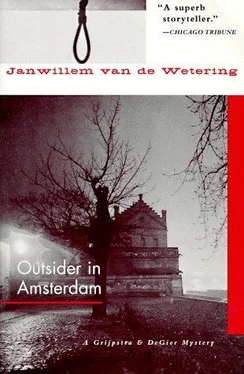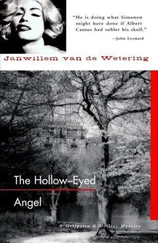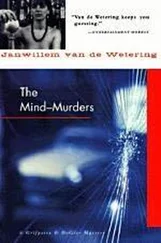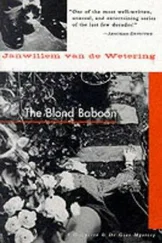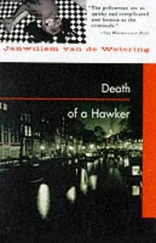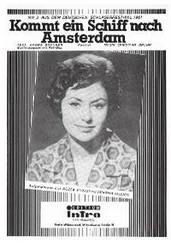Janwillem De Wetering - Outsider in Amsterdam
Здесь есть возможность читать онлайн «Janwillem De Wetering - Outsider in Amsterdam» весь текст электронной книги совершенно бесплатно (целиком полную версию без сокращений). В некоторых случаях можно слушать аудио, скачать через торрент в формате fb2 и присутствует краткое содержание. Жанр: Полицейский детектив, на английском языке. Описание произведения, (предисловие) а так же отзывы посетителей доступны на портале библиотеки ЛибКат.
- Название:Outsider in Amsterdam
- Автор:
- Жанр:
- Год:неизвестен
- ISBN:нет данных
- Рейтинг книги:4 / 5. Голосов: 1
-
Избранное:Добавить в избранное
- Отзывы:
-
Ваша оценка:
- 80
- 1
- 2
- 3
- 4
- 5
Outsider in Amsterdam: краткое содержание, описание и аннотация
Предлагаем к чтению аннотацию, описание, краткое содержание или предисловие (зависит от того, что написал сам автор книги «Outsider in Amsterdam»). Если вы не нашли необходимую информацию о книге — напишите в комментариях, мы постараемся отыскать её.
Outsider in Amsterdam — читать онлайн бесплатно полную книгу (весь текст) целиком
Ниже представлен текст книги, разбитый по страницам. Система сохранения места последней прочитанной страницы, позволяет с удобством читать онлайн бесплатно книгу «Outsider in Amsterdam», без необходимости каждый раз заново искать на чём Вы остановились. Поставьте закладку, и сможете в любой момент перейти на страницу, на которой закончили чтение.
Интервал:
Закладка:
"Joachim de Kater. Piet had no money, not much anyway. Short-term loans at very high interest. I was always around when there was money in the house, money or drugs. I would report sick at work or take a day off. Usually we could organize it all in one day."
"How much were you making yourself?"
"Not as much as you would think," van Meteren said, "about fifty thousand a year, maybe, and free board and lodging. And that was more than Piet had intended. I made him pay me. He was frightened of me. And he needed me, of course. He wouldn't go anywhere without me. I spent the money on the motorbike and on this boat and I intended to save a hundred thousand. Take it to New Guinea with me."
"With a Dutch passport?"
Van Meteren laughed.
"I may be a clown here but in New Guinea it would have been different, it is a very big island and I know it well. I would have found a nice spot and I had made some plans. Wild plans. I might have become a pirate, an admiral with thirty or forty canoes under me, each canoe with a crew of thirty cutthroats. I could have been a king."
"King Doodle the First," de Gier said. "But why did you read all that Dutch history?"
"Curiosity," van Meteren said. "I lived here and I wanted to know where I lived. I read about your tribal wars and about the Romans, and the Spanish, and the French, and the Germans. Your history isn't all that different from ours. Our wars are still tribal but there is only a difference in scale. I have been studying your methods."
"And what did Piet make out of it?" Grijpstra asked.
"More than I did. But he was spending a lot. He was eating in expensive restaurants and spending money in the red quarter. And some of it went into the house at the Haarlemmer Houttuinen. The Society was making some money, but not enough for all the building going on. A new roof alone cost him fifty thousand."
"And Joachim de Kater kept on lending money?"
"Sure. He was making a fortune without lifting a finger. He took the risk that Piet wouldn't repay the loan but he always insisted on guarantees and Piet was using the house as security, and that other house he owned in the south."
"Did Piet have anybody else working for him?"
"No," van Meteren said. "I was his only assistant. He didn't believe in having a lot of people working for him. The Hindist Society was also run with the absolute minimum in manpower. He was a good merchant, he didn't believe in spending his profit on wages. He also didn't believe in sharing his secrets."
The Papuan groaned. Grijpstra sat up and climbed onto the small roof of the cabin. A thin ragged fog seemed to protect the hotter.
"Beautiful," Grijpstra thought. "A pleasure trip. Perhaps I should hire a boat and take the children for a day on the lake."
He sighed and climbed down into the cabin again.
The Papuan had closed his eyes but opened them again when he heard Grijpstra come in.
"It was, in a way, a pleasant, easy business," he said. "Beuzekom was a dangerous man perhaps but he knew I carried a revolver and he was always very polite. When the casks had to be handed over I made him and Ringma do all the carrying. I watched them, and that was all. Piet liked that. 'You are my nice sweet Papuan' he would say. He also used to call me his 'pet tiger.'"
"But you killed him," de Gier said.
"Yes," van Meteren said. "I waited for the right moment. I had to kill him, but it had to be a good kill."
"Had to kill him?" Grijpstra asked.
Van Meteren nodded.
"Perhaps your people in The Hague were right when they refused to accept me into the Dutch police. Perhaps I am still wild. You see, a Papuan chief is killed when his policy of government is wrong. Nobody can judge a chief, he is too powerful. So he is killed at the right moment. The killing is hardly discussed. The tribe decides, but quietly. A certain atmosphere forms itself and everyone agrees. Then one or two men kill the chief, the men who are closest to him. But, it's hard to explain that to you perhaps, those men aren't the killers. The tribe kills."
The detectives stared at van Meteren.
"Do you understand?" he asked.
"A little," de Gier said.
"Perhaps I can make it a little clearer," van Meteren said. "A Papuan has no individual face, you see. He has a name and people know him by that name, but the name is only for convenience. In reality he has no name, no face, no individuality. He belongs to the tribe, and that's all. He is part of a whole."
He looked at the detectives who were still staring at him.
"I met with a tribe once who had never been in contact with either the Dutch or Papuans who were working for the Dutch. One of my patrol had a mirror in his pack and he gave it to one of the tribe's warriors. The warrior was a tall, powerful man with a big nose and a bleached bone had been stuck through the nose. He looked into the mirror and laughed. I asked him why he laughed. He said he had seen a funny fellow who lived in the water."
"What happens if you take a photograph of a group of Papuans and then show it to them?" de Gier asked.
Van Meteren smiled.
"You have understood, I see. Each one will recognize all his friends."
"Except one man," de Gier said. "There'll be one man on the photograph he won't recognize."
"Exactly," van Meteren said.
Runau came into the cabin, they had more coffee and lit cigarettes.
"So you waited for the right moment," Grijpstra said.
"Yes. Therese had thrown a book at him. The book hit him on the temple with such force that he became dizzy. When I came into the room he was sitting on the floor, stunned, with his head in his hands. I ran to his mother's room and made her give me a Pallium pill. She always had a little jar full of those pills. The doctor prescribed as many as she wanted. The pills might be bad for her, but she was old. With a pill in her stomach she would be quiet for a few hours. She is a very difficult woman to handle."
"Yes," de Gier said.
"Did Piet know you were giving him a drug?" Grijpstra asked.
"Perhaps, but he didn't have time to think. I told him to swallow the pill and he swallowed. He didn't have much resistance, he wasn't used to drugs. He would never drink more than two beers or one whisky at a time and even when he smoked hash he would stop after the second cigarette. The pill made him very weak, perhaps he was hardly aware when I hung him."
"But why did you want to kill him?" de Gier asked. "You had been helping him with his business so you must have approved of what he did. Were you after the seventy-five thousand guilders?"
"He didn't have the money," van Meteren said. "He had already spent it."
Grijpstra shook his head and looked as if he were going to say something but de Gier stopped him, touching his arm.
"What had he done with the seventy-five thousand, van Meteren?" de Gier asked pleasantly.
"He had bought heroin," van Meteren said. "Beuzekom was always asking for heroin. Piet didn't have any contacts, he could only buy hash. When Beuzekom kept on asking for heroin Piet contacted Joachim de Kater. Joachim and Beuzekom didn't know each other, Piet always saw them separately. Joachim was interested in the heroin idea. Heroin is very expensive and not as voluminous as hash. Heroin is like gold dust, it's probably the most profitable commodity in the world. Piet told Joachim that he hadn't been able to locate a source of supply, not even in Marseilles, and Joachim became tempted to locate a source himself. He thought he might have a better chance than Piet, and he was right. Joachim de Kater is a member of the establishment, and he had a second asset, he knew his way about in France. I believe he spent a few years in France as a young man, taking a course at the Sorbonne University."
"We had Joachim checked out," Grijpstra said, "but we didn't find out that he had lived in France."
Читать дальшеИнтервал:
Закладка:
Похожие книги на «Outsider in Amsterdam»
Представляем Вашему вниманию похожие книги на «Outsider in Amsterdam» списком для выбора. Мы отобрали схожую по названию и смыслу литературу в надежде предоставить читателям больше вариантов отыскать новые, интересные, ещё непрочитанные произведения.
Обсуждение, отзывы о книге «Outsider in Amsterdam» и просто собственные мнения читателей. Оставьте ваши комментарии, напишите, что Вы думаете о произведении, его смысле или главных героях. Укажите что конкретно понравилось, а что нет, и почему Вы так считаете.
